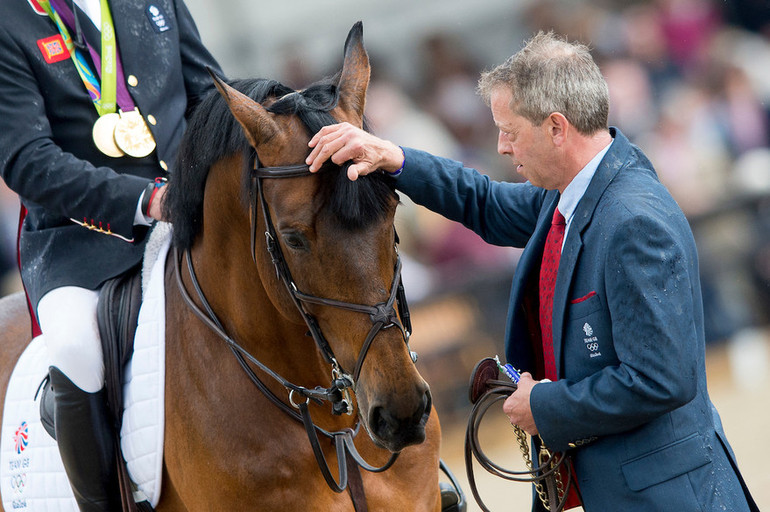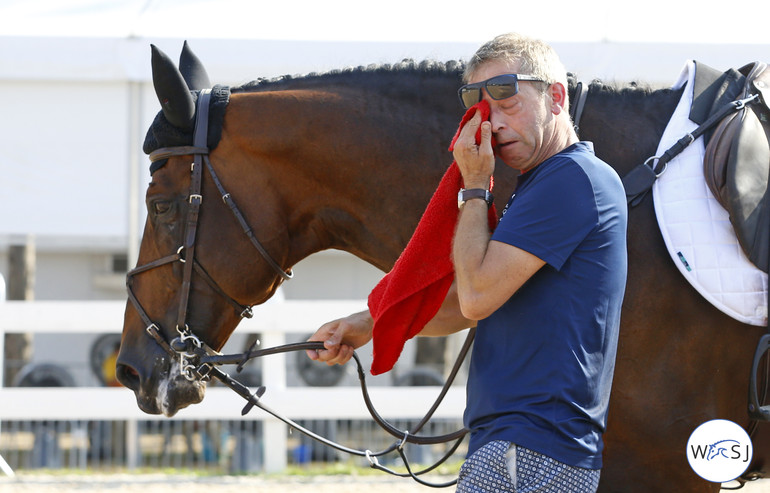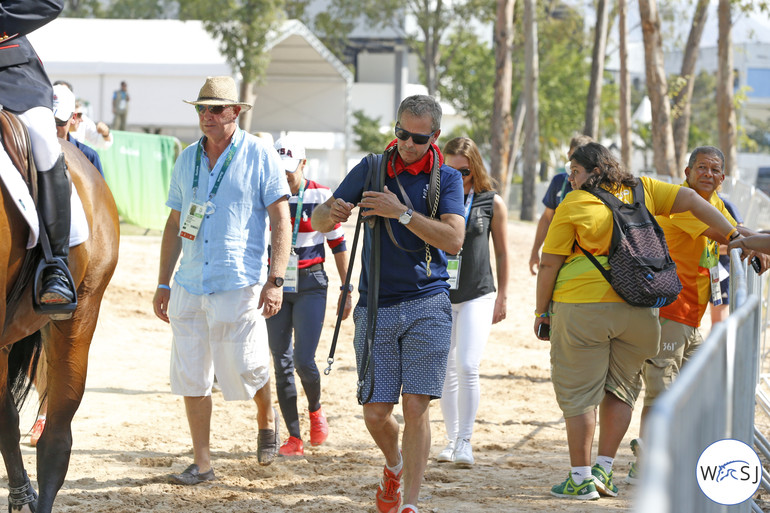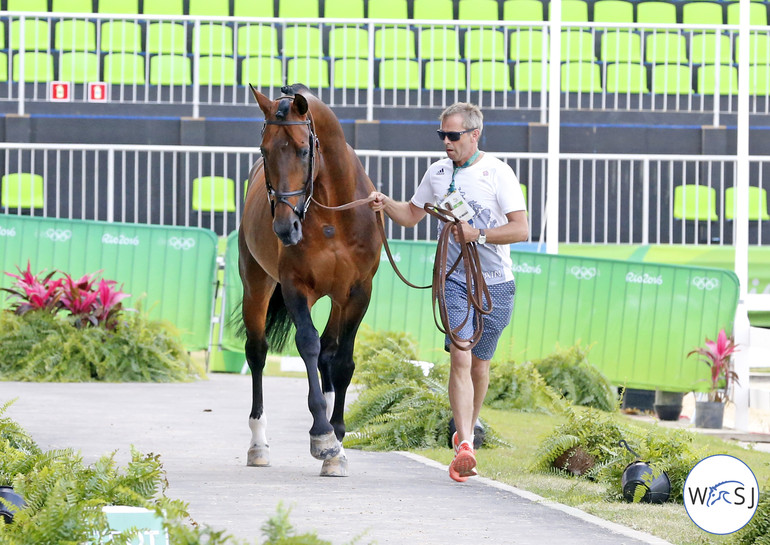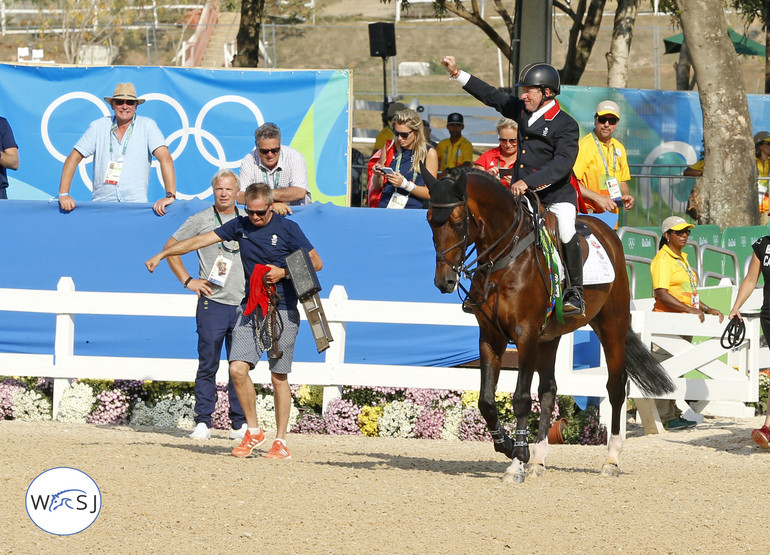Text © World of Showjumping by Nanna Nieminen
Mark Beever has been by Nick Skelton’s side for the past 35 years. But what brought the now 61-year-old to Skelton’s yard in 1985 was a mere coincidence. “Back then I worked for Sally Mapleson, an international showjumper who sent two of her horses for Nick to ride,” Beever begins. “She was asked to send a groom with them. And here I am, 35 years later – it is not normal. I don’t look my age though – and I still do more work than some of these 18-year-olds!” Beever laughs.
Back in 1985, Beever started up as home groom for Skelton. “Nick was just setting up by himself, having his first own yard, and there was a girl called Susie working for him who used to do all the shows,” Beever tells. “After I had been here for a year, she left and I took over her position as the show groom – and ended up at the 1988 Seoul Olympics with Apollo. That is how it all started, really.”
The rest is history, and over the years Beever has been able to participate on a real rollercoaster ride with lots of ups – and a few downs. “The best moment would have to be winning the individual gold medal at the Rio Olympics,” Beever says when asked about his fondest memories. “Apart from that, winning the Aachen Grand Prix – which is the best Grand Prix to win in the world! We won that twice.”
When Nick was still competing, winning used to be what Beever enjoyed the most. “I enjoyed going to shows and win,” Beever recalls. “You have to have that feeling in you, I think you have to be competitive in that way to enjoy going to shows. Now, I still go with Laura sometimes and I love it. I think she is the best lady rider there is,” Beever says about Nick Skelton’s partner Laura Kraut. “I like to see her do well. Also, seeing the young horses progressing in the sport is always rewarding and especially with some of Big Star’s offspring.”
Speaking of Big Star – Beever has been blessed to take care of some marvellous horses. “Dollar Girl would be my all-time favourite horse – ever,” Beever says. “She was a great mare, with lots of riders. She jumped the Olympic Games in Seoul as an 8-year-old with Thomas Fuchs, then went to John Whitaker and after that came to Nick. She was just lovely to look after, she did not have one bad bone in her body. When it comes to horses, if you get a good mare, you can’t beat them. Like Ludger and Ratina – they were just amazing,” Beever continues. “Arko and Big Star would make up my top three. Stallions, as long as they are good to look after, they are ok. Like Big Star, he is a lovely horse and easy as a stallion. He is back at the stud now and comes to Nick from September to March. He is in great form, he still gets ridden every day and gets hacked out with the race horses. When Nick is bored, he jumps him at home and he is just as sound as a pound. Big Star is in absolutely great shape and is loving life.”
“The hardest moment in my grooming career was when Nick broke his neck, in the year of the Sydney Olympics,” Beever continues. “Back then, Nick was told he would never ride again, and that was hard for everybody. Nick had just gotten Arko and had sights set forth with him – and then it was all put on hold for a few years. During Nick’s recovery, Andrew Saywell rode all the horses, he did a lot of work with them. I stayed at the yard; things went on and there were still horses to do so the job was still there. When Nick came home from the hospital, he would stand in our indoor school, training and shout and get very angry because he could not ride himself,” Beever recalls.
In the light of all this, the individual Olympic gold medal in Rio in 2016 was even more special. “Nick had been close to a success like that before, but after all Rio was the icing on the cake. It was all very emotional – I think it would make a good documentary or even a movie,” Beever says.
“Honestly, if I could go back 30 years in time I would rather do that and have it as it was opposed to how it is now,” Beever says when we move on to talk about the changes in the sport over the past thirty years. “Today, the sport is so much about money. Every week, you can jump for a lot of money in big classes. Before, you would go to a few big shows like Aachen or Calgary for this kind of prize money. I suppose it is good for the sport, and for the riders and trainers. But in my opinion, the shows are not the same – it feels like the money has taken over the sport,” Beever says. “The people are also different. Before, we were like a big family – we all helped each other. All the riders used to talk to the grooms and be friendly, but now you are lucky if you get a ‘good morning’. It feels like this sense of helping each other out is lacking. Everyone seems more worried about how their plats are looking on social media, and everyone wants to be better than the rest. And you have got these star levels, where some of the 5* grooms think they are better than the 3* grooms. At the end of the day, we all do the same job. Just in general everything has changed, but so has the world – and I guess it will keep changing,” Beever says.
“There are lots of good grooms around and many of them stay with their riders for a long time. However, I think the grooms have changed too,” Beever continues. “They have so many horses to take care of now, so they cannot take as much time with each of them – like with brushing. It seems to be all about bathing the horses, and I am anti-bathing! In my opinion, you don’t need to soap the horses up all the time. However, I guess this connects to how the whole system has changed. We used to have three horses, do two shows in a row, go home and rest, and then take new horses and go again – this is not how it is now.”
What Beever is also missing is the great combinations from the past: John and Milton, Ludger and Ratina, Pierre and Jappeloup. “Nowadays you just don’t seem to see that,” Beever says. “For sure you have pairs like Ben Maher and Explosion, but they have only been around for a couple of years. It seems like you just don’t see horses lasting that long anymore. I believe it all comes down to the surfaces the horses jump on now – we never used to have these kind of surfaces, we jumped on grass and horses lasted a lot longer. While there are some great horses jumping now, I just think they won’t hold up like some of those really great horses used to.”
In December 2019, Beever was recognized for his years of commitment to the sport at London Olympia where he received the prestigious Ryan’s Son Trophy. The trophy, which has been a tradition at Olympia since 1988, is an award which is given annually by John and Clare Whitaker to a contributor whom has delivered greatly for the sport. Many well-known names are on the list of recipients, and last year Mark Beever became among them. “I was shocked to get it, I always thought it was for more important people – those who are higher up in the ranks in our sport. So, it was a surprise when I got it,” Beever smiles.
“While everyone acknowledges the importance of a good groom, you always feel like an underdog – at least I did,” Beever goes on to explain. “Grooms are doing an important job, but we are always one step below everyone else. These days, grooms are generally treated very well but there are still these areas where certain people would say; ‘No, not here, you are a groom, we don’t want you in here’. I don’t think that underlying attitude will ever change, even though I do think things have improved,” he continues. “At most five-star shows we are very well looked after, but not so much at the lower star levels.”
“Some grooms also work harder because they both drive and groom. I never used to do that and I don’t like that system,” Beever says. “I find it hard to understand why some of the riders won’t be bothered to find a driver and pay for it – if you think about the worth of the horses, is a few hundred euros extra for them being safe really too much? I was always lucky, I never drove. I think some of the grooms now are over-worked and once people get like that, that is where the long face comes from.”
With seemingly everyone being short of staff, getting new people into the industry is a problem and how to find a good groom seems to be the million-dollar question these days. “I think that the younger generation that comes in, they got to want to learn,” Beever points out. “Also, a lot of it goes down to people at home: Give new staff members time to get used to a new system, and be available for them to ask questions. ‘If you don’t know, just ask and we will tell you,’ is what I always say. A part of the problem is that the younger grooms come in looking at their watches and they are always on their phones! I’ve seen people clip and be on their phone at the same time – it is not normal.”
“I love the job, I love horses and that is what keeps me going after all these years. After Nick retired, they thought I would too but there is always another challenge in this line of work – you learn something every day,” Beever tells. “My job is easier now, I work for myself. Nick still rides at home, and I am still tacking up for him. I still enjoy the work, there is nothing else apart from horses I would do.”
“Nowadays, a rider can hardly go to a show without a groom,” Beever says. “Unless you are Nick Skelton, who has been raised from the bottom and knows how to do all of it,” he adds with a smile. “If he was riding now, he could go and do two horses himself. Nick can clip, pull manes, everything. Nowadays, most riders can’t do that. Riders would be lost without their grooms; they know their horses better. A groom’s job is not just looking after the horses – you need to do a lot for the riders as well.”
“Nick is a very good person to work for. I wanted to work for the best and I think I did,” Beever answers when asked about the secret behind his and Nick’s long partnership. “There was never any falling out, Nick would let me go on with my job and vice versa. Also, looking after fantastic horses helped,” he continues. “I think I am an easy, laid back person and the yard here runs like clock-work; it is a nice place to work at. However, it is not all roses. I have done this all my life and you have more downs than ups. Nick has lost more than he has won – you have to take the good with the bad, really.”
No reproduction without permission, copyright © World of Showjumping



